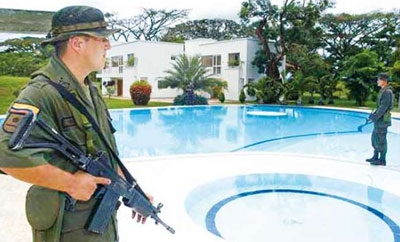Authorities in Colombia have seized more than $6 million of property from the FARC, as the government exerts pressure on the rebels’ criminal interests even as peace talks in Havana inch towards discussing the FARC’s main criminal activity — the drug trade.
Officials from the Asset Forfeiture Unit of the Attorney General’s Office and National Police occupied 50 properties owned by the 45th Front of the Revolutionary Armed Forces of Colombia (FARC) in capital city Bogota and the nearby town of Fusagasuga, reported El Colombiano.
According to officials, the properties were in the names of three members of criminal gang the “R -15.” The gang collaborated with the FARC by kidnapping people and sending them to the 45th Front, which maintains a presence in the Cundinamarca region where Bogota is situated. The R-15 was also apparently engaged in the sale and transport of precursor chemicals for the production of drugs by FARC fronts in northeastern Arauca department, reported El Tiempo.
Among the assets seized were three car dealerships, which authorities say were used to launder money and supply vehicles to transport kidnap victims while they were held for ransom, reported El Espectador.
InSight Crime Analysis
Peace negotiations between the Colombian government and FARC are moving slowly towards the fourth item on the agenda: the solution to the problem of illicit drugs, although an agreement has yet to be reached on the second point — political participation.
In late September the National Forum on the Solution to the Problem of Illicit Drugs was opened, which seeks to explore alternative policies to combating drugs in the country — both production and consumption.
SEE ALSO: FARC, Peace and Possible Criminalization
Both sides have welcomed the initiative. However, as shown by the seizures, there has been no let up in the pressure exerted on the FARC’s criminal activities from the Colombian government. Whether this latest move is a deliberate attempt to turn the screw on the FARC in Colombia as negotiations turn to the rebels’ main criminal interest — the drug trade — in Havana or whether it is unrelated, the seizures are a timely reminder of what is at stake in the Cuba, from a criminal as well as political and military standpoint.

